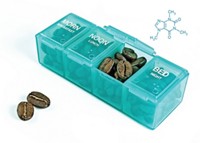Advertisement
Grab your lab coat. Let's get started
Welcome!
Welcome!
Create an account below to get 6 C&EN articles per month, receive newsletters and more - all free.
It seems this is your first time logging in online. Please enter the following information to continue.
As an ACS member you automatically get access to this site. All we need is few more details to create your reading experience.
Not you? Sign in with a different account.
Not you? Sign in with a different account.
ERROR 1
ERROR 1
ERROR 2
ERROR 2
ERROR 2
ERROR 2
ERROR 2
Password and Confirm password must match.
If you have an ACS member number, please enter it here so we can link this account to your membership. (optional)
ERROR 2
ACS values your privacy. By submitting your information, you are gaining access to C&EN and subscribing to our weekly newsletter. We use the information you provide to make your reading experience better, and we will never sell your data to third party members.
Food Science
Newscripts
Vinegar: For more than just cleaning your bathroom
by Melissa Gilden
October 7, 2018
| A version of this story appeared in
Volume 96, Issue 40
Gatorade for the gladiator era

The Newscripts gang has been logging some serious hours in spin class lately, and we’ve been on the hunt for something new and trendy to keep us hydrated. Our old favorite, Gatorade, pride of the Sunshine State, was famously created in 1965 by Robert Cade, a professor of internal medicine and nephrology at the University of Florida College of Medicine. The electrolyte-containing performance beverage was originally so salty it made Florida Gators football players vomit. While Cade is often credited as the originator of the sports drink, a similar beverage was used to rehydrate the Roman army thousands of years earlier. Just in case those Romans were on to something, the Newscripts gang decided to investigate.
Posca was the Gatorade of its time—the Roman Republic era, beginning around 500 BCE. A mix of water and vinegar from wine that had gone bad, posca was rationed to soldiers in the Roman army and may have contributed to the dominance of their military, writes Jonathan Roth in his book “The Logistics of the Roman Army at War.” The acidity of the vinegar would have likely neutralized bacteria, making posca an alternative to scarce potable water during wartime.
Research shows that vinegar can make you feel fuller after a carbohydrate-heavy meal, so posca likely kept the troops’ hunger at bay. Add in herbs, sweetener, and salt to make the drink more palatable and aid in water retention, and you have a secret weapon that’ll keep your military expanding into the Mediterranean long after the betrayal and murder of your general.
Detox cocktails for the rest of us
Vinegary posca may have been the health drink of choice for ancient Roman soldiers, and now consuming different types of vinegar has become a hot trend for its purported health benefits. The most popular to quaff is apple cider vinegar. Its promoters claim that the acidic stuff aids weight loss. A search online and in popular health food stores finds dozens of apple-cider-vinegar-containing drinks. But the Newscripts gang wants to know if there’s any real merit to the fruit vinegar’s many health-enhancing claims.
Advertisement
The primary component of vinegar is acetic acid, which is made by the exposure of ethanol to oxygen. It’s the reason those Romans were able to put their bad wine to good use. While the pro-vinegar movement lacks a longitudinal clinical study of its benefits, some studies have found that acetic acid suppresses body-fat accumulation in animals. More importantly, a 2009 study of 175 obese Japanese people found that body weight, waist circumference, and serum triglyceride levels—which are elevated in metabolic syndrome—were all significantly lower in a daily vinegar-intake group compared with a placebo group (Biosci., Biotechnol., Biochem.,DOI: 10.1271/bbb.90231).
The Mayo Clinic is skeptical of these claims, however. The health care group’s website notes that the consumption of apple cider vinegar has not been proved to encourage sustainable and significant weight loss among diverse groups of people. Furthermore, apple cider vinegar could irritate the throat and esophagus, and the stuff might interact with prescribed diuretics and insulin, leading to lowered potassium levels.
When it comes to trendy vinegar consumption, you’re welcome to do as the Romans did, but the Newscripts gang will stick with what it knows best: peer-reviewed, double-blind, longitudinal science.
Please send comments and suggestions to newscripts@acs.org.



Join the conversation
Contact the reporter
Submit a Letter to the Editor for publication
Engage with us on Twitter